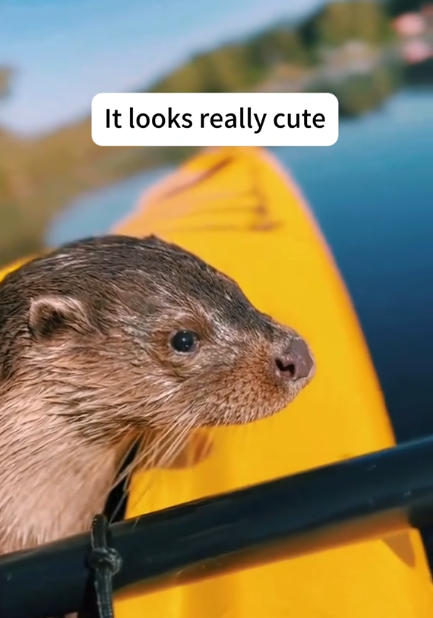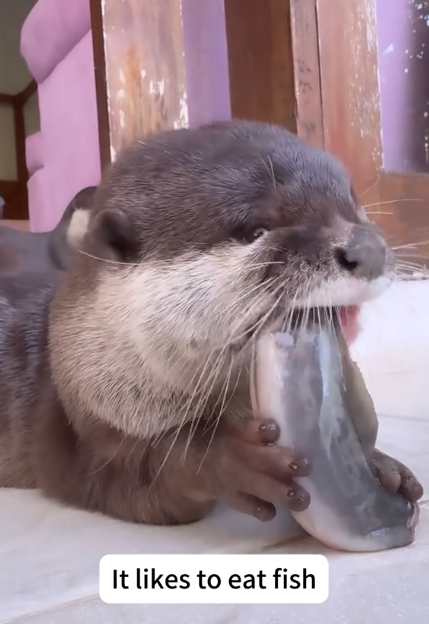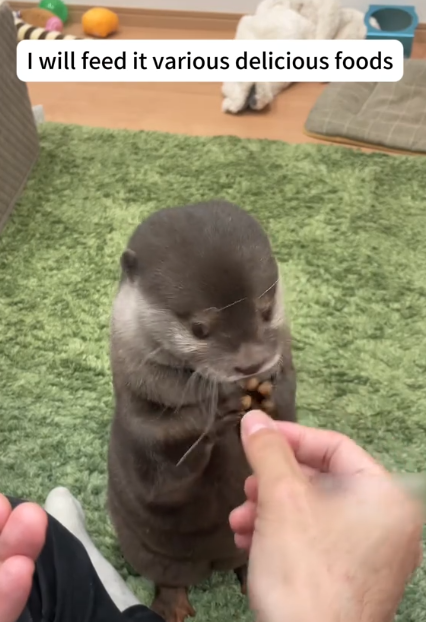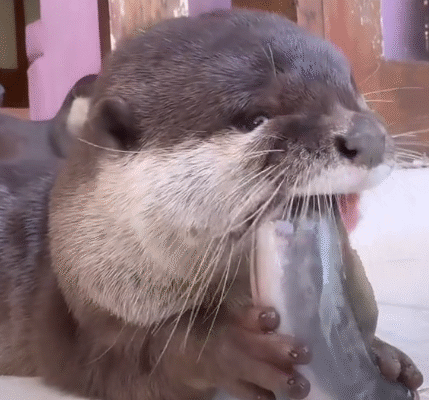
The morning was quiet, the kind of stillness only found when the sun is just peeking over the horizon and the river’s surface looks like glass. I had taken my small wooden boat out early, hoping to catch a few fish before the midday heat set in. My oars dipped into the water with a rhythmic splash, the air smelling faintly of damp reeds and distant pine.
It was in this peaceful moment, when the only company I expected was the occasional heron, that it happened.
From the corner of my eye, a blur of brown broke the calm—a sudden ripple, then a tiny splash. Before I could even register what was happening, a little otter clambered onto the side of my boat. Its fur was slick and shiny, beads of water rolling off like polished marbles. The otter looked at me with wide, curious eyes, whiskers twitching as if it were sizing me up.
“Uh… hello?” I said out loud, my voice somewhere between surprise and disbelief.
The otter, of course, didn’t answer in words. Instead, it shook itself vigorously, sending a fine mist of cold droplets all over me, then plopped down on the wooden floorboards like it had always belonged there.
At first, I thought it might have been escaping from something—a predator, or maybe an aggressive rival in the river. But as I looked around, there was nothing alarming nearby. The otter simply seemed… interested.
I slowly reached for a small fish from my bucket, holding it out cautiously. The otter sniffed, then gently took it from my fingers, crunching it down with a satisfied little squeak. And just like that, we were friends.
From that morning on, the otter began visiting my boat regularly. I started calling him “Ripple,” because that’s how I first noticed him—disturbing the perfect stillness of the water. At first, Ripple’s visits were unpredictable. Some days I wouldn’t see him at all; other days, he’d appear the moment I pushed off from shore.
Ripple wasn’t shy about making himself comfortable. He would lounge across my tackle box, poke his nose into my bait bucket, or curl up on a coil of rope to nap in the sun. Once, he even tried to steal my sandwich, darting away with it and sitting at the bow to eat like a smug little pirate.
But what struck me most was his personality. Ripple was endlessly curious. If I pulled up my net, he would peer inside, inspecting every wriggling fish. If I stopped rowing to fix something, he would watch intently, head tilting side to side as though memorizing every movement. Sometimes, he’d dive into the river and resurface with a fish of his own, proudly placing it at my feet as if to say, See? I’m pulling my weight here.

One late afternoon, after weeks of these playful encounters, the river turned stormy. Dark clouds rolled in without warning, and the calm water transformed into choppy waves. I was halfway back to shore when I spotted Ripple swimming frantically a few meters away. His usual graceful strokes were replaced with frantic splashing—he was struggling against the current.
Without thinking, I rowed toward him, reaching out as he neared the boat. He scrambled up with help from my hands, soaked and shivering. His small body pressed against my leg, and for the first time, he didn’t try to explore or play. He just stayed close, breathing fast, eyes half-closed.
By the time we reached the dock, the rain was falling in heavy sheets. I wrapped Ripple in an old towel, holding him until his trembling eased. I didn’t know if otters usually trusted humans this much, but in that moment, I knew something had shifted between us. We weren’t just two creatures sharing a river anymore. We were something closer—unlikely companions who had pulled each other from the currents of our own worlds.
Ripple’s visits became more frequent after that storm. It was almost as if he’d decided my boat was a safe harbor, a place where he could always find warmth, food, and a curious human to share his day with. Sometimes, when fishing was slow, I would just sit and watch him. He had a way of making every moment interesting—floating on his back, tossing a pebble in the air, diving and reappearing like a living magic trick.
One day, I noticed something different. Ripple wasn’t alone. A smaller otter, younger and shyer, followed him at a distance. Ripple would swim ahead, then turn and make a soft chirping noise until the little one came closer.
When they both hopped onto my boat, I realized this was Ripple’s way of introducing me to his world. The younger otter stayed close to Ripple at first, but eventually inched toward me. I offered a fish, and after a moment’s hesitation, it took it—just as Ripple had on that very first day.
From then on, my mornings on the river felt richer. I was no longer just a fisherman; I was part of an odd little trio. Ripple would lead the way, the younger otter—whom I called Pebble—would follow, and together we’d spend hours drifting, fishing, and enjoying the quiet company.

As the seasons shifted, I noticed the changes in the river. Autumn brought golden leaves floating on the surface, and winter left a thin crust of ice near the shore. Even in the cold months, Ripple and Pebble found me, sometimes climbing aboard just to bask in a rare patch of sun.
People in town began asking about the “boat otters,” as they started calling them. A few neighbors didn’t believe my stories until they saw Ripple jump onto my boat themselves, chattering away like he was giving me the day’s news.
I never tried to keep them, never tempted to make them pets. They belonged to the river, to the wild. But our friendship was real in its own way, built not on ownership, but on shared space and trust. They came and went freely, and that freedom made every meeting feel like a gift.
The day I knew our chapter was changing came in early spring. Ripple arrived, but Pebble was noticeably bigger, sleeker, and more independent. They didn’t stay on the boat long—just enough for Ripple to nuzzle my hand and Pebble to snatch a fish. Then, without ceremony, they slipped back into the water and swam off together toward the wider, deeper parts of the river.
I didn’t see them for weeks after that. Part of me missed them deeply, the way you miss a friend who moves far away. But another part of me felt at peace, knowing they were out there, thriving.
Still, every time I take the boat out, I keep an extra fish in the bucket—just in case.
And sometimes, when the morning is quiet and the river is still, I imagine a ripple breaking the surface, a sleek head popping up, and those familiar eyes meeting mine again.
The story between me and that little otter may have started by chance, but it left a mark that runs deeper than the river itself.



